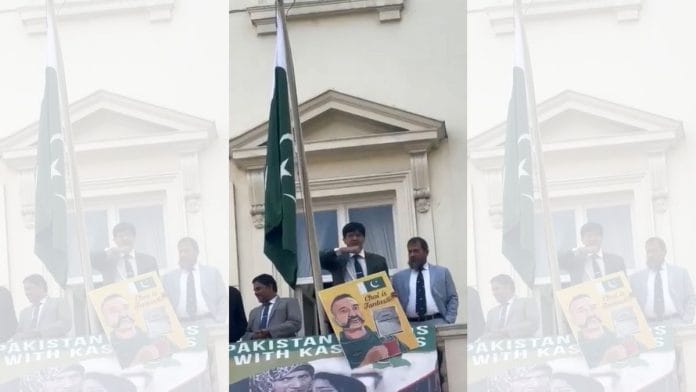New Delhi: A demonstration outside the Pakistan High Commission in London turned volatile Friday after a senior Pakistani military officer was captured on video making a threatening throat-slitting gesture toward Indian community protesters.
The incident occurred as more than 500 members of the Indian and Jewish communities gathered to condemn the April 22 terrorist attack in Pahalgam, Jammu and Kashmir, which killed 26 civilians, including one Nepali national. Protesters waved Indian flags, held placards denouncing Pakistan’s support for terror outfits, and chanted slogans demanding justice and accountability.
In videos that quickly went viral, Colonel Taimur Rahat, the Pakistan Army and Air Advisor posted at the High Commission, was seen standing behind police barricades, staring at protesters while drawing his hand across his throat — a gesture widely interpreted as a death threat. The colonel also held a placard bearing an image of Indian Air Force officer Group Captain Abhinandan Varthaman, who was captured and later released by Pakistan during the 2019 Pulwama crisis.
The protesters also accused officials inside the High Commission of playing loud, celebratory music during the demonstration. In a statement, the event organisers called the actions “a tone-deaf and disgraceful act” that “added deep insult to an already grievous injury.”
“Today’s protest was a call for justice and accountability. While the world mourns the victims, the embassy’s actions displayed a shocking lack of empathy and human decency,” the organisers said.
The incident has sparked a fresh diplomatic row. Protesters have called on the British government to summon Pakistan’s High Commissioner and demand an official explanation. They are also urging London to press Islamabad to condemn the Pahalgam attack and sever ties with militant groups operating in the region.
The fallout from the Pahalgam attack has already been severe. In response, India moved swiftly to close the Attari Integrated Check Post, suspend the South Asian Association for Regional Cooperation (SAARC) Visa Exemption Scheme for Pakistani nationals, and order Pakistani diplomatic staff to return home within 40 hours. India also announced plans to reduce the number of diplomatic personnel in both countries’ High Commissions.
Perhaps most significantly, India halted the implementation of the Indus Waters Treaty, the 1960 World Bank-brokered agreement governing water sharing between the two countries — a move that experts say could reshape South Asia’s already fragile security landscape.
A day earlier, Pakistan People’s Party (PPP) chairman Bilawal Bhutto-Zardari had said at a rally, “Either our water flows in this Indus, or it will be their blood because the river belongs to Pakistan, and any move to strip it away will meet fierce resistance.”
Responding to the developments, Union Minister Hardeep Singh Puri condemned both Bhutto-Zardari’s recent incendiary comments and the London incident. Speaking to reporters, Mr. Puri dismissed Bhutto-Zardari’s threat — “either our water flows through the Indus or their blood” — as reckless and desperate.
“I heard his statement. Tell him to jump somewhere in the water,” Puri said. “Well, how will he when there will be no water? Do not dignify such statements. They will understand soon enough.”
Addressing the throat-slitting gesture made by Colonel Rahat, Puri described it as “state-sponsored terrorism.”
“We have reached a point where they will have to pay a price,” he said. “If they think they can survive the suspension of the Indus Waters Treaty, I wish them the best of luck.”
(Edited by Radifah Kabir)
Also Read: From Bajwa to ‘Munir Doctrine’ & peace in Kashmir—why India believes Pakistan greenlit Pahalgam







If I were Modi, I would have told spies to chop his hands.